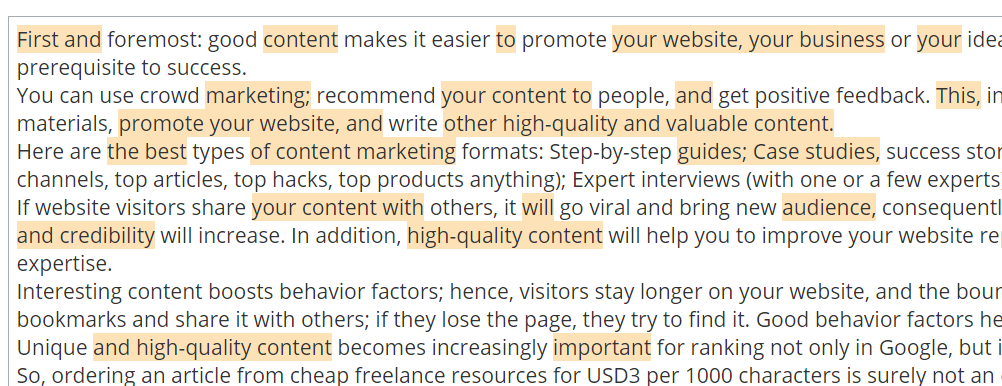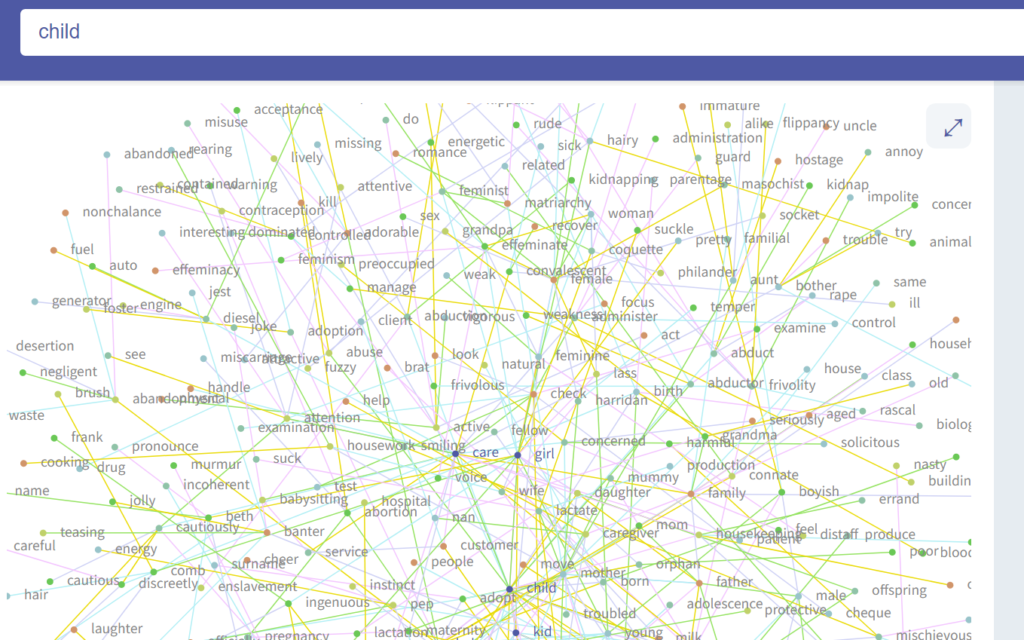Content is still the key ranking factor: good content makes it easier to promote your website, your business or your ideas – whatever you market, quality text is an essential prerequisite to success.
You can use crowd marketing; recommend your content to people, and get positive feedback. This, in turn, will enhance your motivation to share your materials, promote your website, and write other high-quality and valuable content. Here are the best types of content marketing formats:
- Step-by-step guides;
- Case studies, success stories;
- Lists of top things (top websites, top video channels, top articles, top hacks, top products – anything);
- Expert interviews (with one or a few experts);
- Tests, comparisons;
- Error and failure analysis.
Consequently, if website visitors find your content valuable and share it with others, it may go viral and bring new audience, therefore, your website or individual page’s trustworthiness and credibility will increase (ranks higher!). In addition, high-quality content will help you to improve your website reputation, enhance your brand image and show your expertise.
Besides, interesting content boosts behavior factors; hence, visitors stay longer on your website, and the bounce rate decreases; users add your website to bookmarks and share; if they lose the page, they try to find it. Good behavior factors help you get a higher position.
Unique and high-quality content becomes increasingly important for ranking not only in Google, but in the Russian leading search engine Yandex as well. So, ordering an article from cheap freelance resources for USD3 per 1000 characters is surely not an option. Baden-Baden, Panda, and other search engines’ filters hunt for a full of fluff SEO content describing what has been already described hundreds of times. Since the beginning of 2018, Yandex has knocked down a lot of informational websites that did not have good behavioral factors, were over-advertised, and had low-value content.
Well then, what are the magic tricks that can add quality to your website and make your content work to its best?
Add a blog or a news feed to your website
We vote for adding a Blog or ‘News and Articles’ section on a website: if you post regularly some quality content, this demonstrates to the search engines that your business is more than alive. There should be informational articles and posts, containing search queries (search semantics) that will bring more traffic to them, increasing the number of potential clients. Forming a bulk of regular visitors, who would eagerly consume your useful updates, will signal the search engines that your website is a great source for many users and provide higher ranking not only in organic search, but also in such services as maps or some other on Yandex and Google searches.
Structure pages and posts content better
Indeed, well-structured content brings more visitors, makes them stay longer and decrease bounce rates. Correspondingly, it gets more attention from search robots.
It’s a must for your posts and articles to have:
- Lists;
- Diagrams, charts, images, infographics;
- Pictures;
- Videos (it’s ok if they’re not your own)
- Links to other pages (you can also add relevant external links to your content).
Post unique content
Uniqueness of texts is an essential element of SEO content writing , and it should be carefully checked before posting to a website. There are online services that can help you check this and even see which parts of the text need more attention. (text.ru, Advego, content-watch.ru, etc.). In fact, there is no ‘appropriate persentage’ of uniquieness, as they say, ‘it is either 100% unique or not unique’. But, to tell the truth, online checks don’t work like that. There are always words or word combinations that repeat themselves, so 85% uniquieness is a great parameter, 100% is perfect but almost unreacheable in online checks. See the pic below: thou I wrote this article from scratch, it shows 84% originality (which is kinda insulting), highlighting the words that I must have stolen somewhere in their opinion:

Low uniqueness of your content can result from the following:
- Someone plagiarized the whole text or a significant fragment
- You or your SEO specialists published the same content on different resources: the company’s catalog, press release, forum, etc.
- There are duplicate parts of your content on other pages of your site.
The situation with content uniqueness is not the easiest. Even if you were the source, a more authoritative site, who stole your text, might still rank higher than you. Luckily, your website will be considered a primary source in most cases.
Anyway, if a page is significant for marketing and has a low percentage of uniqueness — better rewrite it. And don’t forget to do research before rewriting content, for example, by examining highly ranked competitors’ websites. Analyse competitors’ websites as often as possible: it’ll never be superfluous to look at top competitors and learn what kind of content they have, how it is presented and optimized, etc.
Check parameters of top competitor websites for a particular keyword
Top SERP’s analysis can provide valuable data to help you write and edit your content, what parameters should be increased or decreased and by how much. A good online checker service shows:
- Word count of a text;
- Number of exact match keywords in content;
- Percentage of keywords in content;
- Keywords in the Title tag;
- Keywords in external link anchor tag;
- Percentage of query preprocessing;
- Absence of words in the content that competitors frequently use;
- Number of relevant documents by Title tag;
- Internal links in URL;
- Word count of Title tag;
- External links in a domain;
- HTTPS protocol and the percentage of competitor websites working on HTTPS.
You can also check more general parameters of competitor websites – such as the number of pages in the search index, the age of the domain, whether it is in Yandex Catalog, DMOZ, which pages are in the top – the main or 2nd level pages, and deeper.
Use words semantically related to your content in your copy
Search engines understand not only the structure of your website and its text but also its semantics: they can tell relations between the words and their combitations, and make out a kind of ‘cloud of words’, related to the field you are writing about on your page or throughout the whole website.
When writing content, it is vital to use synonyms, antonyms, combitatory phrases, as well as words that search engines recommend, words that competitors commonly use, toponyms and niche terms. These used to be called ‘LSI words’ that form a frame or an onthology (or, let’s put it in simple words, a dictionary) of the field you write on, providing more context and making it easier for users and search engines to understand the page content. LSI is not only about synonyms, moreover, not all synonyms are LSI-words. “Children” is a synonym of “kids“, but words related to this word are caring, toys, education, kidndergarten, teacher… or other, depending on the topic of your webpage.
How can you find words that are semantically related to your content?
- Investigate related searches in Google or Yandex
- Use a search engine autocomplete feature (when entering a keyword there will be a dropdown of autocomplete list)
- See what people also ask (PPA results, at the bottom of search page)
- use special serices (eg. Semrush, free LSI keyword generators, LSI graph), words association dictionaries)

Regardless of whether you are using LSI keywords or any SEO specific tricks, your primary goal is to provide readers with clearly cut, concise, and maximum valuable information, that gives them the answers and solutions to what they are seeking on the internet.

